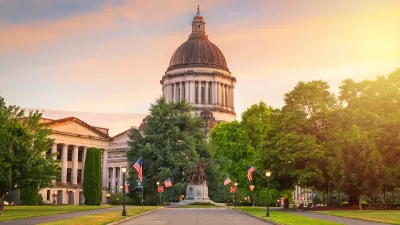In carbon-tax friendly Australia wind energy production is now cheaper than coal and natural gas.
"Renewables are getting cheaper, and fossil fuels are getting more expensive," hearkens New York Times bestselling author and progressive radio talk show host Thom Hartman.
According to a new study by Bloomberg New Energy Finance, in carbon tax-friendly Australia wind energy costs AU$80/MWh, roughly half the price of coal and 3/4 the price of natural gas production. Even without the carbon tax surcharge, wind energy remains 15-20 percent cheaper.
While natural gas is cheapest in the United States, the tide may be turning.
"According to the Energy Information Administration, looking ahead to 2016, natural gas is the cheapest energy in the United States at roughly $66/MWh. Coal comes in second at $94/MWh. But right behind coal is renewable wind at $97/MWh, which in large part accounts for why U.S. wind energy production has tripled since 2000," writes Hartman.
Hartman believes that if the United States altered its laws to shift the burden of paying for the collateral costs of burning fossil fuels to energy companies, the policy would effect a tipping point toward renewable energy production.
Collateral costs that affect the U.S. consumer include pollution and climate change, impact on health and healthcare costs, the military cost of protecting oil producing allies abroad and decreasing property values from power plant construction.
FULL STORY: A New Manhattan Project

Maui's Vacation Rental Debate Turns Ugly
Verbal attacks, misinformation campaigns and fistfights plague a high-stakes debate to convert thousands of vacation rentals into long-term housing.

Planetizen Federal Action Tracker
A weekly monitor of how Trump’s orders and actions are impacting planners and planning in America.

San Francisco Suspends Traffic Calming Amidst Record Deaths
Citing “a challenging fiscal landscape,” the city will cease the program on the heels of 42 traffic deaths, including 24 pedestrians.

Defunct Pittsburgh Power Plant to Become Residential Tower
A decommissioned steam heat plant will be redeveloped into almost 100 affordable housing units.

Trump Prompts Restructuring of Transportation Research Board in “Unprecedented Overreach”
The TRB has eliminated more than half of its committees including those focused on climate, equity, and cities.

Amtrak Rolls Out New Orleans to Alabama “Mardi Gras” Train
The new service will operate morning and evening departures between Mobile and New Orleans.
Urban Design for Planners 1: Software Tools
This six-course series explores essential urban design concepts using open source software and equips planners with the tools they need to participate fully in the urban design process.
Planning for Universal Design
Learn the tools for implementing Universal Design in planning regulations.
Heyer Gruel & Associates PA
JM Goldson LLC
Custer County Colorado
City of Camden Redevelopment Agency
City of Astoria
Transportation Research & Education Center (TREC) at Portland State University
Jefferson Parish Government
Camden Redevelopment Agency
City of Claremont




























